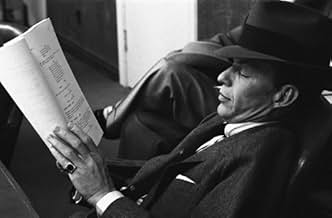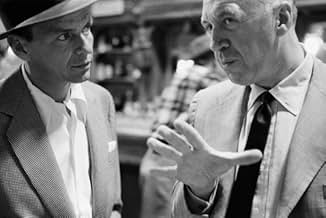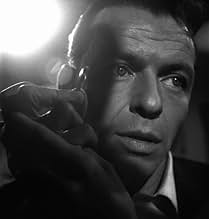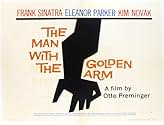IMDb-BEWERTUNG
7,3/10
12.965
IHRE BEWERTUNG
Ein Junkie muss sich seinem wahren Ich stellen, um seine Drogensucht zu überwinden.Ein Junkie muss sich seinem wahren Ich stellen, um seine Drogensucht zu überwinden.Ein Junkie muss sich seinem wahren Ich stellen, um seine Drogensucht zu überwinden.
- Für 3 Oscars nominiert
- 3 Gewinne & 8 Nominierungen insgesamt
Jered Barclay
- Junkie in Lock-Up
- (Nicht genannt)
Leonard Bremen
- Cabbie in Lock-Up
- (Nicht genannt)
Paul E. Burns
- Suspenders in Lock-Up
- (Nicht genannt)
Pete Candoli
- Jazz Musician
- (Nicht genannt)
Herschel Graham
- Club Safari Patron
- (Nicht genannt)
Harold 'Tommy' Hart
- Officer Kvorka
- (Nicht genannt)
Empfohlene Bewertungen
A strung-out junkie (Frank Sinatra) deals with daily demoralizing drug addiction while crippled wife (Eleanor Parker) and card sharks continue to pull him down.
While this is not the first film to deal with drugs, it is probably the first to deal with them in a very serious manner. "Reefer Madness" and "Cocaine Fiends", for example, can be written off as humorous nostalgia. This film, on the other hand, is decades ahead of "Trainspotting" and "Requiem For a Dream". (Did you even know heroin addiction was prominent in the 1950s?)
Variety called the film "a gripping, fascinating film, expertly produced and directed and performed with marked conviction by Frank Sinatra as the drug slave." I agree for the most part, though I really did not enjoy Sinatra's acting as much as many others did, I think. Otto Preminger is a first-rate director, and I hope this film gets the respect it deserves over the long run (I found the 50th anniversary release to be not nearly cleaned up enough).
While the focus is heroin and addiction, one could also make a case about this film being about love. Frankie's wife brings him down, encourages him to go back to his old habits, turns him away from his dreams. Molly (Kim Novak) does just the opposite. Divorce and adultery are hardly ever positive topics, but in this film you almost hope that Frankie goes that route.
While this is not the first film to deal with drugs, it is probably the first to deal with them in a very serious manner. "Reefer Madness" and "Cocaine Fiends", for example, can be written off as humorous nostalgia. This film, on the other hand, is decades ahead of "Trainspotting" and "Requiem For a Dream". (Did you even know heroin addiction was prominent in the 1950s?)
Variety called the film "a gripping, fascinating film, expertly produced and directed and performed with marked conviction by Frank Sinatra as the drug slave." I agree for the most part, though I really did not enjoy Sinatra's acting as much as many others did, I think. Otto Preminger is a first-rate director, and I hope this film gets the respect it deserves over the long run (I found the 50th anniversary release to be not nearly cleaned up enough).
While the focus is heroin and addiction, one could also make a case about this film being about love. Frankie's wife brings him down, encourages him to go back to his old habits, turns him away from his dreams. Molly (Kim Novak) does just the opposite. Divorce and adultery are hardly ever positive topics, but in this film you almost hope that Frankie goes that route.
I loved that this movie takes place on an imaginary block of an imaginary city. You could say the streets represents a state of mind just like the title of
Chinatown did two decades later. Here degeneracy and addiction are the
norm. This place sucks you in and wont let go. It's here that Sinatra must face his demons when he returns home after getting clean at a rehab clinic. The film ends up being just as much about moving on from the past as it does about drug addiction.
Sinatra's junky is a bit amorphous, we never really learn whether he grew up here or what led him to his addictions. However, the story is strong and told with a nice brisk pace. There are some real memorable moments (the Gambling
sequence, Frankie coming off smack, etc). Preminger's direction is great, some subtle camera work adds a lot to a number of scenes. Elmer Berstein's score
and Saul Bass' titles perfectly set the mood. Overall, an endearing film you should check out.
Chinatown did two decades later. Here degeneracy and addiction are the
norm. This place sucks you in and wont let go. It's here that Sinatra must face his demons when he returns home after getting clean at a rehab clinic. The film ends up being just as much about moving on from the past as it does about drug addiction.
Sinatra's junky is a bit amorphous, we never really learn whether he grew up here or what led him to his addictions. However, the story is strong and told with a nice brisk pace. There are some real memorable moments (the Gambling
sequence, Frankie coming off smack, etc). Preminger's direction is great, some subtle camera work adds a lot to a number of scenes. Elmer Berstein's score
and Saul Bass' titles perfectly set the mood. Overall, an endearing film you should check out.
I am willling to BET very few of You have seen this amazing mid-50´s CLASSIC! I am particularly anxious to share my impressions and thoughts about it with You readers....
Those of You who remember seeing Frank Sinatra in this film at a movie theater during the first year of its release surely must be in Your 80´s or 90´s... How did I manage to see it thusly when I am now ONLY 75?¿? I will share that with You in a moment....
....But FIRST: Let us FOCUS on the Title's CONTENT and CONTEXT:
If you're under 80, there's probably no way you can remember how controversial and cutting edge MAN WITH The GOLDEN ARM was when it was released in 1955! Fortunately for me, my parents were very liberal in permitting me to see films and even took me to see it just after turning Eight.
WOW! What a tremendous impact it had on me. It was the first "Grown-up" film that clearly made me realize there was more to cinema than just Sci-Fi/Horror, Westerns and Kids' movies!
Mainstream cinema had NEVER touched the subjects of drug addiction and heroin withdrawal, which were considered taboo topics, even at the dinner table, let alone as the focus of a movie to be shown in public! The MPAA (Motion Picture Association of America) refused to give its seal of approval to GOLDEN ARM, forcing Producer/Director Otto Preminger and Distributor United Artists to release it without the MPAA's seal. This decision, of course, contributed greatly to both the films commercial and critical success! It also opened the door to new ways of making, distributing and classifying films.
Before my recent third viewing, I had only seen it once at age 8, mentioned above, and again, in my late teens (Perhaps the 10th Anniversary Re-Release?). Despite some of the production elements and dialog that do date the film considerably, the last half of GOLDEN ARM had me in a virtual headlock!
The acting, Bernstein music, photography and editing all contribute to the mood of the movie, precisely as Otto Preminger intended! The scene where Machine (Sinatra) undergoes withdrawal pains is still unbelievably hard-hitting today.
In general, Sinatra's performance is quite surprising. His Oscar nomination was very well deserved. When you consider this performance in conjunction with Sinatra's role in MANCHURIAN CANDIDATE and FROM HERE to ETERNITY, you begin to appreciate just how underrated OLD BLUE EYES was as an ACTOR! 9* STARS*
..... ENJOY! / DISFRUTELA!
Any comments, questions or observations, in English o en ESPAÑOL,, are most welcome!
Those of You who remember seeing Frank Sinatra in this film at a movie theater during the first year of its release surely must be in Your 80´s or 90´s... How did I manage to see it thusly when I am now ONLY 75?¿? I will share that with You in a moment....
....But FIRST: Let us FOCUS on the Title's CONTENT and CONTEXT:
If you're under 80, there's probably no way you can remember how controversial and cutting edge MAN WITH The GOLDEN ARM was when it was released in 1955! Fortunately for me, my parents were very liberal in permitting me to see films and even took me to see it just after turning Eight.
WOW! What a tremendous impact it had on me. It was the first "Grown-up" film that clearly made me realize there was more to cinema than just Sci-Fi/Horror, Westerns and Kids' movies!
Mainstream cinema had NEVER touched the subjects of drug addiction and heroin withdrawal, which were considered taboo topics, even at the dinner table, let alone as the focus of a movie to be shown in public! The MPAA (Motion Picture Association of America) refused to give its seal of approval to GOLDEN ARM, forcing Producer/Director Otto Preminger and Distributor United Artists to release it without the MPAA's seal. This decision, of course, contributed greatly to both the films commercial and critical success! It also opened the door to new ways of making, distributing and classifying films.
Before my recent third viewing, I had only seen it once at age 8, mentioned above, and again, in my late teens (Perhaps the 10th Anniversary Re-Release?). Despite some of the production elements and dialog that do date the film considerably, the last half of GOLDEN ARM had me in a virtual headlock!
The acting, Bernstein music, photography and editing all contribute to the mood of the movie, precisely as Otto Preminger intended! The scene where Machine (Sinatra) undergoes withdrawal pains is still unbelievably hard-hitting today.
In general, Sinatra's performance is quite surprising. His Oscar nomination was very well deserved. When you consider this performance in conjunction with Sinatra's role in MANCHURIAN CANDIDATE and FROM HERE to ETERNITY, you begin to appreciate just how underrated OLD BLUE EYES was as an ACTOR! 9* STARS*
..... ENJOY! / DISFRUTELA!
Any comments, questions or observations, in English o en ESPAÑOL,, are most welcome!
Great story. Gritty 50's melodrama played very well by Sinatra and Novak. Great comedic performance by Arnold Stang who definitely deserved more attention after this film.
Also contains one of the most brilliant soundtracks to a film ever made. Sinister accompaniment to Frankie Machine's spiraling demise, it plays so well as the unrelenting "monkey on his back" appears again and again.
Great lingo, too. Very happy the word "lush" is used to describe an alcoholic. Very cool.
Great cinema. An underappreciated piece of American genius.
Also contains one of the most brilliant soundtracks to a film ever made. Sinister accompaniment to Frankie Machine's spiraling demise, it plays so well as the unrelenting "monkey on his back" appears again and again.
Great lingo, too. Very happy the word "lush" is used to describe an alcoholic. Very cool.
Great cinema. An underappreciated piece of American genius.
The Man With a Golden Arm was one of a trio of great films around that same time that dealt with drug addiction. The other two were Monkey On My Back and A Hatful of Rain. But I think of the three this one is the best.
Maybe if Otto Preminger had shot the thing in the real Chicago instead of those obvious studio sets the film might have been better yet. Who knows, maybe Preminger couldn't get enough money to pay for the location. It's the only flaw I find in the film.
Frank Sinatra is a heroin addicted card dealer who was busted for covering for his boss Robert Strauss when the game was raided. He took the cure while in jail and wants a new life as a jazz drummer. But a whole lot of people are conspiring against him.
First Bob Strauss who wants him back dealing, especially because a couple of heavyweight gamblers are in town. He uses a few underhanded methods to get Sinatra's services back. Secondly Darren McGavin is the local dope dealer who wants Sinatra good and hooked as a customer again. And finally Eleanor Parker his clinging wife who's working a con game to beat all, just to keep him around.
Frank Sinatra got a nomination for Best Actor for this film, but lost to Ernest Borgnine in Marty. Sinatra might have won for this one if he hadn't won for From Here to Eternity in the Supporting Actor category a few years back and that Marty was such an acclaimed film in that year. His scenes going through withdrawal locked up in Kim Novak's apartment will leave you shaken.
Eleanor Parker does not get enough credit for her role. She's really something as the crazy scheming wife who wants Sinatra tied to her no matter what the cost. If she had not been nominated that same year for Interrupted Melody, she might have been nominated for this. 1955 marked the high point of her career.
Darren McGavin got his first real notice as the very serpentine drug peddler. His performance is guaranteed to make your flesh crawl.
Elmer Bernstein contributed a great jazz score to accentuate the general dinginess of the bleak Chicago neighborhood the characters live in. Not a place you'd want to bring up your family.
Maybe if Otto Preminger had shot the thing in the real Chicago instead of those obvious studio sets the film might have been better yet. Who knows, maybe Preminger couldn't get enough money to pay for the location. It's the only flaw I find in the film.
Frank Sinatra is a heroin addicted card dealer who was busted for covering for his boss Robert Strauss when the game was raided. He took the cure while in jail and wants a new life as a jazz drummer. But a whole lot of people are conspiring against him.
First Bob Strauss who wants him back dealing, especially because a couple of heavyweight gamblers are in town. He uses a few underhanded methods to get Sinatra's services back. Secondly Darren McGavin is the local dope dealer who wants Sinatra good and hooked as a customer again. And finally Eleanor Parker his clinging wife who's working a con game to beat all, just to keep him around.
Frank Sinatra got a nomination for Best Actor for this film, but lost to Ernest Borgnine in Marty. Sinatra might have won for this one if he hadn't won for From Here to Eternity in the Supporting Actor category a few years back and that Marty was such an acclaimed film in that year. His scenes going through withdrawal locked up in Kim Novak's apartment will leave you shaken.
Eleanor Parker does not get enough credit for her role. She's really something as the crazy scheming wife who wants Sinatra tied to her no matter what the cost. If she had not been nominated that same year for Interrupted Melody, she might have been nominated for this. 1955 marked the high point of her career.
Darren McGavin got his first real notice as the very serpentine drug peddler. His performance is guaranteed to make your flesh crawl.
Elmer Bernstein contributed a great jazz score to accentuate the general dinginess of the bleak Chicago neighborhood the characters live in. Not a place you'd want to bring up your family.
Wusstest du schon
- WissenswertesFrank Sinatra jumped at a chance to star in the film before reading the entire script.
- PatzerIn a scene about twenty minutes in, as the camera exits the bar following Frankie, the jukebox can be seen to slide out of the way of the camera at the bottom of the screen.
- VerbindungenEdited into Bass on Titles (1982)
Top-Auswahl
Melde dich zum Bewerten an und greife auf die Watchlist für personalisierte Empfehlungen zu.
- How long is The Man with the Golden Arm?Powered by Alexa
Details
- Erscheinungsdatum
- Herkunftsland
- Sprachen
- Auch bekannt als
- El hombre del brazo de oro
- Drehorte
- Produktionsfirma
- Weitere beteiligte Unternehmen bei IMDbPro anzeigen
Box Office
- Budget
- 1.000.000 $ (geschätzt)
- Weltweiter Bruttoertrag
- 4.652 $
- Laufzeit
- 1 Std. 59 Min.(119 min)
- Farbe
- Seitenverhältnis
- 1.85 : 1
Zu dieser Seite beitragen
Bearbeitung vorschlagen oder fehlenden Inhalt hinzufügen









































